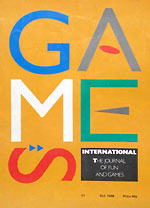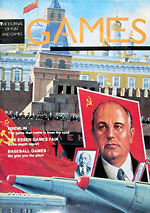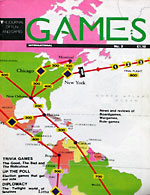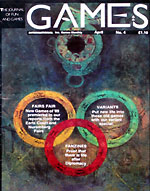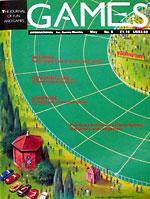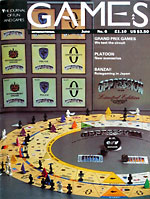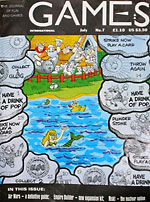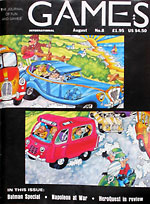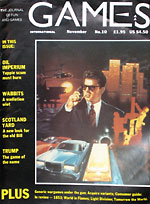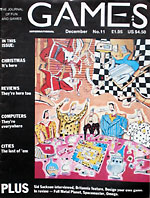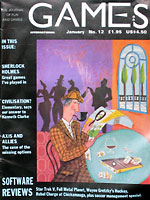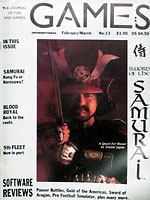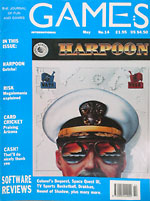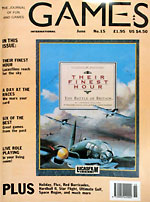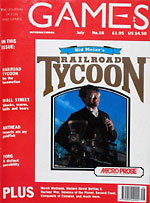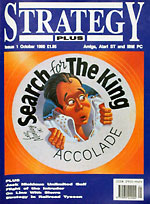ON A COLD AND GREY NOVEMBER DAY
When I visited London in November 1988 one of my usual evening strolls led me to "Just Games" a small games shop just off Regent Street. I had visited them before and knew that I would find a wide range of imported boardgames, in particular those from the United States.
 This time my attention was drawn to something completely
different: a magazine called "Games International", which not only
appeared to be produced very professionally but also carried an interesting
combination of articles about foreign and German games. At the time I was not aware
that German games were known in Britain at all.
This time my attention was drawn to something completely
different: a magazine called "Games International", which not only
appeared to be produced very professionally but also carried an interesting
combination of articles about foreign and German games. At the time I was not aware
that German games were known in Britain at all.
Hence, I bought a copy and spent the rest of the evening in my hotel room, reading what appeared to be the first issue of a very different games magazine. I was so intrigued by the mag that I filled in the subscription form that very night and sent it off the next day.
At that time I already subscribed to one of the most popular German game journals "Pöppelrevue", which covered the German boardgame market pretty well. But much to my surprise GI provided me with a new view about the games I thought I knew pretty well. On the one hand there was none of the rather dry style of writing I was used to from Pöppelrevue. Many articles had this humorous kind of "straight from the heart" style elegantly spiced with the odd pun, which made reading them not only interesting but fun. On the other hand, the mag contained details about strategies and variants, which were completely new to me.
THE BRIGHT SIDE OF THE MOON
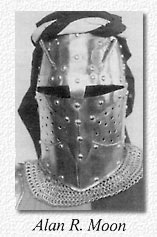 The type of games covered and their rating made me feel sort of
"at home". The first issue had favourable reviews about
"Kremlin", "6-Tage Rennen" and "McMulti" - games we
liked and played a lot at the time. In addition, GI #1 included a strategy article
about "Schoko&Co.", something of a size and depth I never seen before
in a German games magazine. Taking a note of the author provided some clue, as Alan
R. Moon was known to me as a writer for Avalon Hill's house magazine
"General". Besides the fact that the "General" was quite
expensive in Germany it also was pretty hard to find. So seeing that GI managed to
get one of their authors on the payroll convinced me that GI was the right mag for
me.
The type of games covered and their rating made me feel sort of
"at home". The first issue had favourable reviews about
"Kremlin", "6-Tage Rennen" and "McMulti" - games we
liked and played a lot at the time. In addition, GI #1 included a strategy article
about "Schoko&Co.", something of a size and depth I never seen before
in a German games magazine. Taking a note of the author provided some clue, as Alan
R. Moon was known to me as a writer for Avalon Hill's house magazine
"General". Besides the fact that the "General" was quite
expensive in Germany it also was pretty hard to find. So seeing that GI managed to
get one of their authors on the payroll convinced me that GI was the right mag for
me.
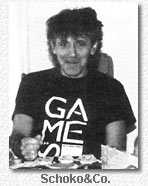 Talking about Alan R. Moon: he was introduced as GI's
"American Desk" and Brian Walker, GI's editor, wrote a rather strange
(in my eyes) staff profile about him. It commenced with providing a photo of an
empty suit of armour as "Alan R. Moon" - something which later proved to
be some kind of a GI policy: "Never provide a photo of any of the staff".
To my knowledge, this policy has been broken only once when issue #4 carried a photo
showing Brian "Schoko & Co." Walker together with Steve Jackson and
Ian Livingstone. Unless, of course, this was some kind of an inside joke; so I
provide the photo for reference and I'm happy to receive comments on this.
Talking about Alan R. Moon: he was introduced as GI's
"American Desk" and Brian Walker, GI's editor, wrote a rather strange
(in my eyes) staff profile about him. It commenced with providing a photo of an
empty suit of armour as "Alan R. Moon" - something which later proved to
be some kind of a GI policy: "Never provide a photo of any of the staff".
To my knowledge, this policy has been broken only once when issue #4 carried a photo
showing Brian "Schoko & Co." Walker together with Steve Jackson and
Ian Livingstone. Unless, of course, this was some kind of an inside joke; so I
provide the photo for reference and I'm happy to receive comments on this.
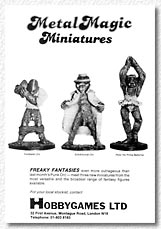 Other now well known names of the gaming hobby contributed
regularly to GI: Derek Carver ("Blood Royal", "Showbiz"), Stuart
Dagger ("Counter"), Phil Orbanes ("Infinity"), David Parlett
("Hare and Tortoise"), David Pritchard ("Games and Puzzles") and
Mike Siggins ("Counter") to name just a few.
Other now well known names of the gaming hobby contributed
regularly to GI: Derek Carver ("Blood Royal", "Showbiz"), Stuart
Dagger ("Counter"), Phil Orbanes ("Infinity"), David Parlett
("Hare and Tortoise"), David Pritchard ("Games and Puzzles") and
Mike Siggins ("Counter") to name just a few.
The structure of GI's content was based on game categories: general games, abstract games, war games and role-playing games besides "standard" columns like an editorial ("Up Front"), travel reports and reader letters ("Rebound"). I cannot remember a mag where I enjoyed the editorial as much as Brian Walker's "Up Front". Besides being informative the tongue-in-cheek humour sometimes was hilarious. The way Brian dealt with the uproar about Metal Magic's ad (with the "orcs with the dorks" photo) in his "Members not allowed" column was simply fantastic.
GAMES PEOPLE PLAY
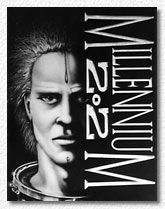 German games were covered regularly, not only by reviews but also
providing in depth strategy articles. "Die Macher", "Schoko
&Co." and other games were covered together with excellent
strategy advice or variants. GI later decided to import German games to make them
available in the UK via national mail order. Good for the German games industry but
also a clear indication of the condition the British game market was in at the time.
German games were covered regularly, not only by reviews but also
providing in depth strategy articles. "Die Macher", "Schoko
&Co." and other games were covered together with excellent
strategy advice or variants. GI later decided to import German games to make them
available in the UK via national mail order. Good for the German games industry but
also a clear indication of the condition the British game market was in at the time.
The competition amongst the game mags in the UK must have been fierce as shown by the problems "Games Monthly" went through in 1989 and the quarrel between GI and "Games Review Monthly" in late 1989. Luckily, GI had decided early to not only address the UK market but to make the mag available in the US and Germany as well. Nevertheless, in 1989 GI had to realize that boardgaming was getting competition from a different direction altogether: computer games. So during what must have been a sort of self finding break the September issue of GI was skipped and appeared as Sep/Oct issue (#9) in October 1989 - containing the first articles on computer games. Consequently, the cover photo showed "Millennium 2.2" to clearly demonstrate the change.
CYBER HOUSE RULES
 At the time I was just getting into computer games myself so this
change was rather welcomed. In the summer 1990 I decided to buy my first PC - at a
ridiculously high price compared to today's standards - mainly because of Brian
Walkers and Bruce Shelley's coverage of the computer game "Railroad
Tycoon" in GI issue #16 in July 1990 - take that as an example of the press
influencing decisions.
At the time I was just getting into computer games myself so this
change was rather welcomed. In the summer 1990 I decided to buy my first PC - at a
ridiculously high price compared to today's standards - mainly because of Brian
Walkers and Bruce Shelley's coverage of the computer game "Railroad
Tycoon" in GI issue #16 in July 1990 - take that as an example of the press
influencing decisions.
While GI was still covering both boardgames and computer games a principle change in marketing strategy became visible when the August and September 1990 issues of GI were skipped and the mag's October issue appeared under the new name "Strategy Plus" issue #1 with a clear focus on computer games. It took however another 9 months until Brian Walker decided to convert "Strategy Plus" into a computer games only magazine - issue #10 of SP was the last one with a boardgame section.
More changes followed course: from issue #18 SP was no longer printed in the UK but in the States, probably due to Brian Walker's moving house to the United States. But things didn't work out the way Brian had intended and hoped (see the interview below) and in the end the August 1993 issue (#33) of SP was the last with him as the editor. Following this SP dwindled into irrelevance - at least from my perspective.
NET ACT
So why do I write this article? GI was an excellent boardgaming mag which I liked very much and the demise of which I deplored a lot. So this is supposed to be a homage about the magazine. But there is more than just that. In the meantime the same has happened to another excellent boardgaming publication I had subscribed: "Pöppelrevue". This indicates to me that the market for such publications is rather small probably because only diehard boardgamers will spend money for game reviews, news and strategy articles. While the Internet was not around in the late 80's it may well present an additional threat to printed boardgame magazines today. Reviews, session reports, strategies, variants and other articles are readily available on the Net - for free. And sites like ours may well expedite the end of printed game magazines. And what shall I read in bed when that happens?
TALKS WITH MR. WALKS
The following interview with Brian Walker, the former editor of Games International and Strategy Plus, was conducted via email in late December 2003.
- WPG: Games International was launched in 1988. What was your main purpose to publish a magazine targeted at the serious gamer?
- BW: My aim was to attract anyone with an interest in boardgames, serious or not.
- WPG: You visited the "North Shore Gaming Club" in the U.S twice in 1988. Did these visits play a role in your decision to create GI?
- BW: No, these visits were just for fun.
- WPG: One of the unique selling points of GI was the focus on German style games. Wasn't this a kind of risky marketing approach?
- BW: I never really had a 'marketing approach'. German games seemed to me to be the best around at that time so I gave them some coverage. It was very exciting on a personal level to discover these games, so I figured that if they excited me then they would the reader.
- WPG: You made it possible to mail-order German games through the GI's office. Do you regard yourself successful in bringing German games to Britain?
- BW: This was a reader service; I don't think 'success' is the right term. I'm happy that German games are now relatively widespread but it would be ludicrous for one person to take credit for this.
- WPG: The second issue of GI appeared with over a month late. Were the GI launch date and the intended monthly issues kind of a false start, especially when considering that the next issues were published without a date on the cover?
- BW: The conditions under which the first few issues were produced were really chaotic - I went through three production editors in the first three months. Paul Mason then joined up in that capacity and steadied the ship. I don't think the 'false start' had any effect long term.
- WPG: In issue #4 you mentioned that GI will be using Games Monthly's distribution channels and that GM subscribers would receive 2 GI issues for free. What is the story behind that?
- BW: Steve Nicholls of Games Monthly, didn't want to continue publishing his mag, but also didn't want to leave his subscribers high and dry. We met up and arranged what was a mutually beneficial deal. In the case of GI that meant using GM's newsstand distributor that enabled us to have a bigger print run. In the event, we didn't sell that many more copies.
- WPG: Right from the start you covered American games through Alan R. Moon as your "American Desk". Had it been your initial intention to market GI in Britain and the States?
- BW: Alan Moon makes an excellent desk, but my intention was to market the mag to any country that would stock it. The US game shops did not take very many and US newsstands were out of the question. Most Americans at that time didn't even realise that Germany had a games industry, so the content and the general tenor of the mag would have made no sense to them, as indeed it made no sense to many British readers.
- WPG: GI not only was available in British game shops, also major stores in the United States carried it. Did you sell more copies in the States than in Britain?
- BW: No, because it was available on some newsstands here as well as in game shops.
- WPG: How successful was GI commercially?
- BW: Not at all.
- WPG: Can you share the size of the print run and number of subscribers GI had in 1989?
- BW: I think we printed around 8000 and sold around 2000. We had in the region of 400 subscribers.
- WPG: The September/October 1989 issue of GI had a new section "Computer Games". Was GI running out of review material for boardgames?
- BW: We never ran out of material for boardgames but we were always running out of cash.
- WPG: After 16 issues of GI the name was changed to "Strategy Plus", giving even more room to computer games. Why did you change the name of the magazine?
- BW: It was part of a transition to computer games, as the realisation that a boardgames mag in the UK could never make money. On a personal level I also wanted to be part of a successful industry - this is not the description I would use for boardgames industry in the UK.
- WPG: Issue 10 of Strategy Plus was the last to cover boardgames. Judging by the excellent articles about boardgames GI & SP had you must have had a lot of complaints from boardgamers. Right?
- BW: Remarkably few. There were a few moans from predictable quarters but readers seemed very understanding about the difficulties the magazine faced. There were very few requests for the subscription refunds that I offered.
- WPG: SP's issue 33 (Aug. '93) was the last one with you as the editor. What was the reason for you to leave SP?
- BW: This was a terrible period for me. I was living in Vermont and loathing every minute of it. I discovered that my US partner was ripping off the mag by transferring profits to his other company. So there I was, finally producing a successful magazine in every sense and all he could do was steal. I even had to take him to court just to get the shares that I'd been promised. I managed to win an out-of-court settlement, part of the agreement of which was that I would never talk about any of this.
- WPG: Let's take a look at the media for boardgaming related review and information. Compared to 15 years ago we now see a lot of Internet sites, which publish game reviews on a regular basis. As all of these contents are provided for free, doesn't this render printed game magazines obsolete?
- BW: All magazines face a similar problem, if it can be called thus. A site like boardgamegeek is fantastic and provides a resource for the hobby that no print mag can compete with. However, a good editor will ensure that a magazine competes in areas that websites cannot reach. Had the internet been as prominent in GI's days as it is now, I believed it would have helped the mag. I would have seen it as a friend, and not as competition. The real problem is that the market for a boardgames magazine is very limited, internet or not.
- WPG: It appears that only recently you returned to boardgaming. Can you tell us something about your games related work in the last ten years?
- BW: I'm afraid I joined the dark side and worked for a couple of computer game companies. I produced Championship Manager 2 and Stars! I co-designed and produced International Cricket Captain. These are all games that I'm proud to be associated with.
- WPG: What do you think of the boardgames scene now.
- BW: I think it's wonderful, much better then when I was involved in it (surely a coincidence!). There are a lot of very good games and not just from Germany. I like what Bruno Faidutti is doing in France, and Martin Wallace in the UK. Best of all, it's great to see Alan Moon getting the success he richly deserves. Any industry out of which the 'desk' can make a living has got to have something going for it.
- WPG: Any boardgaming plans for the future?
- BW: I'm working on a book on boardgames and am currently talking to publishers, but I'm not overly optimistic about getting a deal. I'm also trying to persuade some of the more serious newspapers here (in the UK) to give me a weekly column.
- WPG: Any additional remarks you would like to add?
- BW: As a postscript, I'd like to thanks any contributors to GI who may be reading this for their contributions in making the mag what it was, for better or worse. I just wish it was still around.
WPG: Brian, we'd like to thank you very much for the interview and wish you all the best for the future. We do hope to see more on boardgames from you soon. (Brian can be reached at Mr.walks@btopenworld.com)
